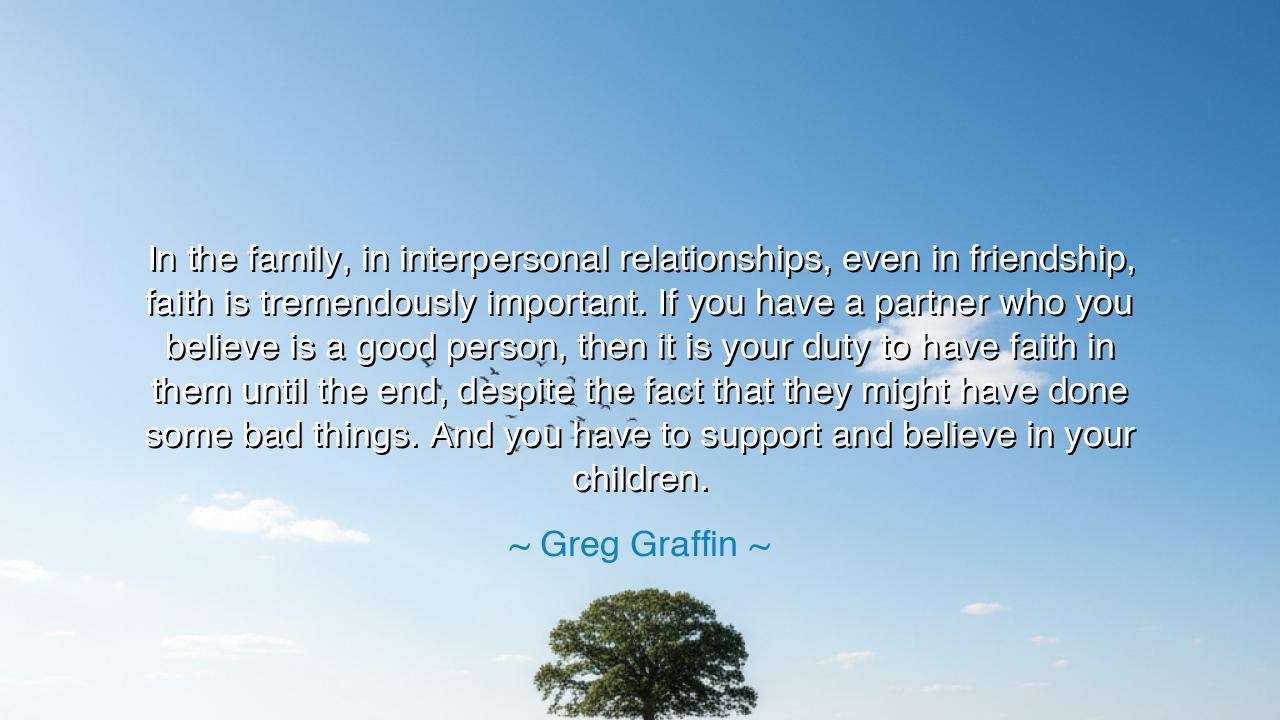
In the family, in interpersonal relationships, even in
In the family, in interpersonal relationships, even in friendship, faith is tremendously important. If you have a partner who you believe is a good person, then it is your duty to have faith in them until the end, despite the fact that they might have done some bad things. And you have to support and believe in your children.






In the ancient sagas, where heroes faced trials and strife, the deepest bonds were often tested by moments of great difficulty and doubt. Greg Graffin, in his reflection on the importance of faith in relationships, speaks to a truth that transcends time: "In the family, in interpersonal relationships, even in friendship, faith is tremendously important. If you have a partner who you believe is a good person, then it is your duty to have faith in them until the end, despite the fact that they might have done some bad things. And you have to support and believe in your children." These words are an invitation to recognize that faith is not a passive sentiment but an active, sustaining force that holds the very fabric of our relationships together. It is a truth woven deeply into the stories of the ancients, where loyalty and belief in others were seen as the greatest virtues.
The ancient Greeks understood the power of faith in relationships, especially within family and friendship. Take the bond between Odysseus and his wife Penelope. Though Odysseus was lost to her for many years, and the world around her believed him dead, Penelope held onto her faith in her husband. Her belief in his eventual return sustained her and guided her decisions, despite the challenges and temptations she faced in his absence. In this, faith was not blind; it was a choice, a commitment to believe in someone’s core character, even in the face of uncertainty. This is what Graffin speaks of—how, in relationships, our faith in one another holds us firm against the storms that may arise.
The great Greek philosopher Aristotle also spoke of the power of faith within the context of friendship. He argued that true friendship is based not on mutual convenience, but on a deep and abiding belief in the virtue of the other person. True friends, he wrote, are those who trust one another through the ups and downs of life, supporting each other through moments of weakness and failure. In these relationships, faith becomes a pillar that upholds both individuals, even when one falters. Similarly, in Graffin’s words, our belief in the goodness of our loved ones, especially our partners and children, sustains the connection we share, even when they make mistakes or fall short of perfection.
Consider also the biblical story of Job, whose faith in God was tested by profound suffering. He lost everything—his wealth, his children, and his health. Yet through it all, he never wavered in his belief that God was good. In the end, his faith was not only rewarded but proved to be the foundation of his restoration. In Job's journey, we see how faith in others, and in ourselves, is a force that can bring about healing and redemption. Graffin’s reflection invites us to carry this same faith in our closest relationships—trusting that, despite their flaws or mistakes, the goodness of those we love is worthy of our unwavering belief.
The lesson from Graffin’s words is profound. In our relationships, faith is not merely a fleeting emotion but a constant choice, a decision to believe in the goodness of others even when their actions may cause us doubt. It is in the family, in friendship, and in our closest bonds that this faith is most needed, for these relationships are where the most intense challenges arise. Faith is the glue that binds us in times of difficulty, the anchor that keeps us steady when the winds of conflict or failure threaten to pull us apart.
In our own lives, we must recognize the power of faith in sustaining love and loyalty. When we face disappointment or hardship with those we care about, it is easy to question their worth or their commitment. But it is in these moments of trial that we must choose to support and believe in them, just as Penelope believed in Odysseus and Job believed in the divine. Let us be people who offer unwavering faith to those we love, choosing to see the good in them, even when they stumble. In doing so, we nurture stronger relationships and build a foundation that can withstand the tests of time.
Thus, let us embrace Graffin’s wisdom and choose to live with faith in






AAdministratorAdministrator
Welcome, honored guests. Please leave a comment, we will respond soon